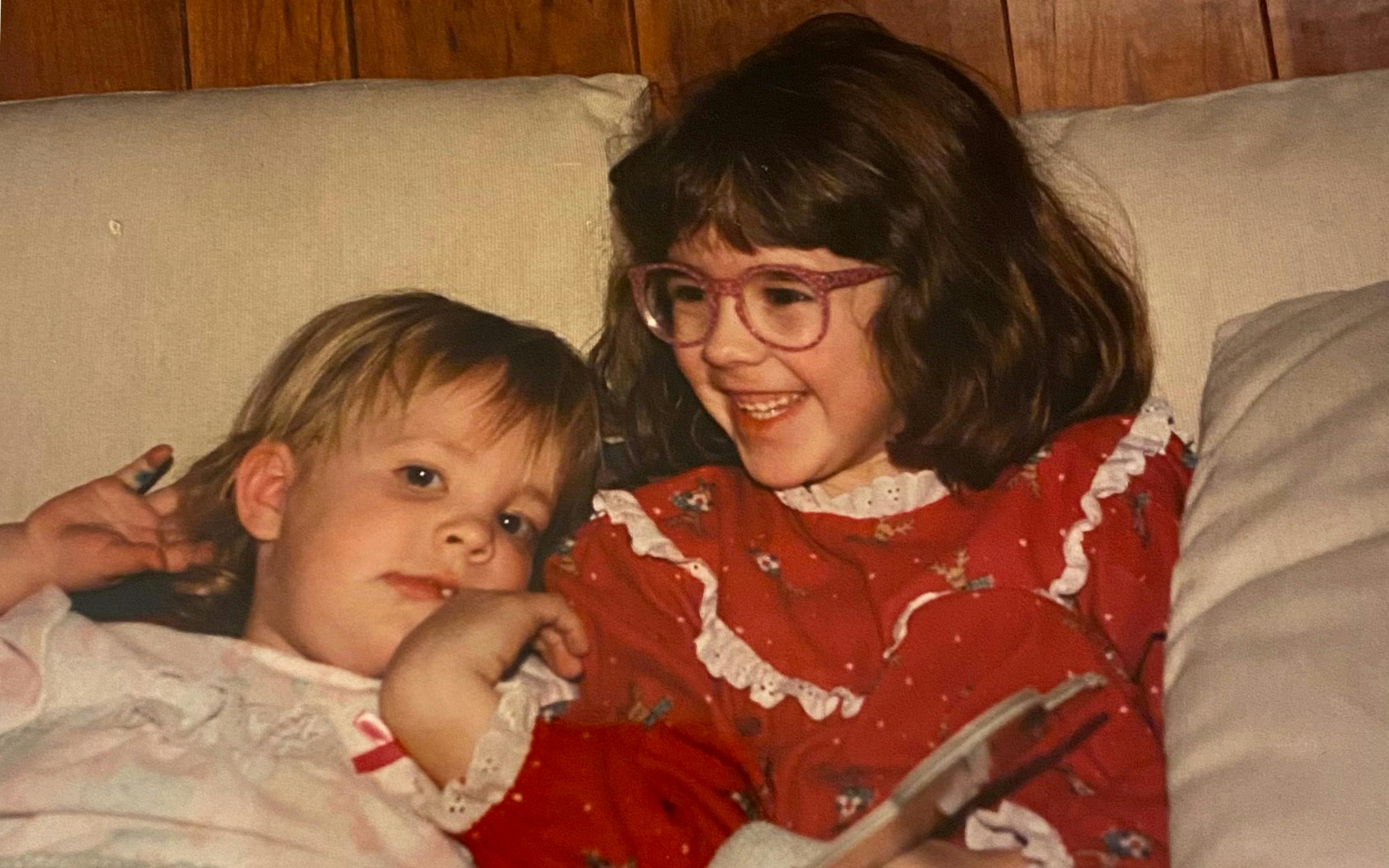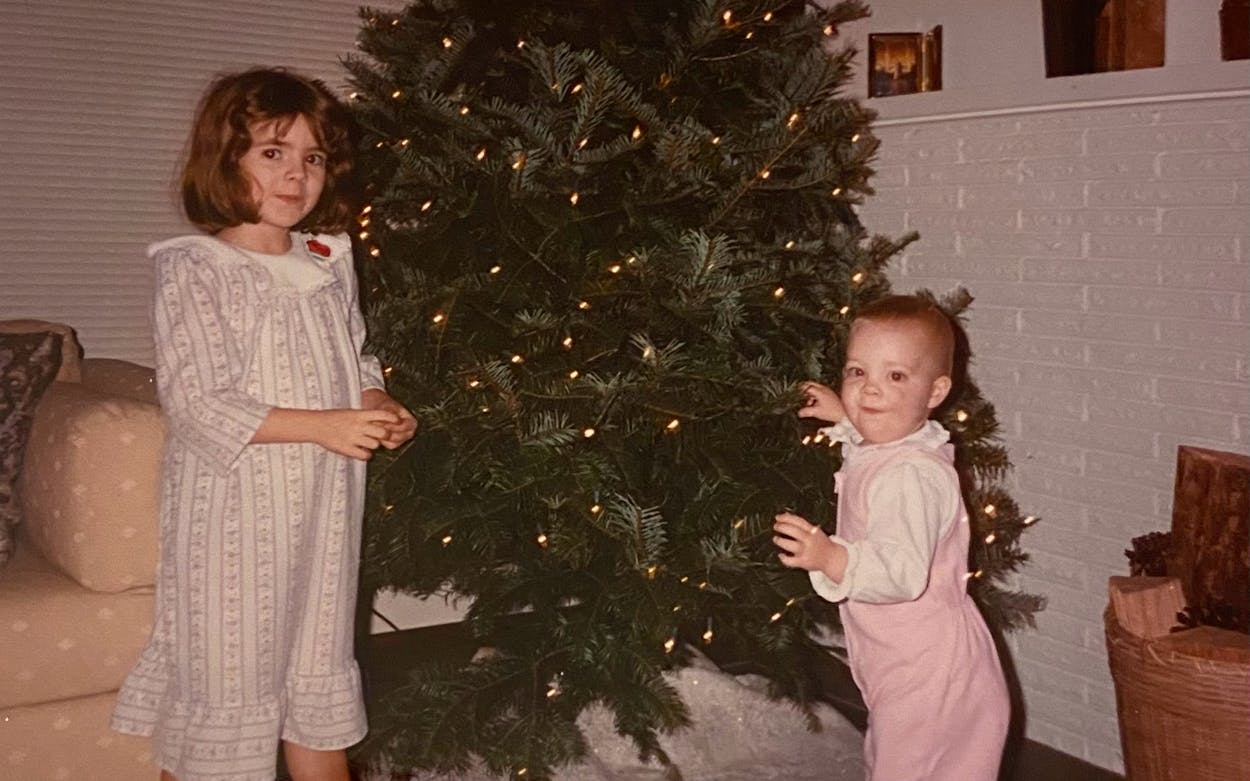My sister and I were raised Catholic, but after a few early years enrolled at a school called Sacred Heart, I stopped attending mass every week. Our family eased into a lifestyle some might call “lapsed.”
By 2009, when I left Washington state to move to Austin, I rarely went at all. Christmas Eve is an exception. I always came home for the holidays, and my mother, sister, and I would usually slip into a pew near the back and listen to the choir sing hymns. My sister, Ellie (a pseudonym), loves the smell of the candles melting. Unlike me, she goes to mass regularly. Or she did before the coronavirus started to whittle away the routines that give her life so much meaning. The first COVID-19 case in the United States was confirmed one county north of where she was living in a group home for women with intellectual and developmental disabilities. It wasn’t long after that her world started to contract.
The YMCA where she likes to swim closed. So did the center for adults with special needs where Ellie, who has autism, takes classes. The cafe that employs her part-time to tidy tables told her not to come in—no one was eating. As the risk of infection grew, she stopped leaving the house at all.
One of the things she missed most, Ellie said, was mass. Though she could livestream church services on her computer, it wasn’t the same. Being at church reminded her of our childhood. The music moved her, and she liked to watch the faithful file into their pews. The free doughnuts that eventually appeared on folding tables near the baptismal pool were also a perk.
Craving that experience, my sister started to shop for Communion wafers online. Amazon sells the cassock robes that priests wear, she told me. She wondered if she should buy a Holy Water sprinkler. Ellie wanted to give Communion to her housemates at a makeshift church in her bedroom, where a calendar with photos of goldendoodles, her favorite kind of dog, hung on the wall.
I’ve never felt much kinship with the parishioners at the Catholic church. But I find comfort in its rituals, knowing the exact words the priest will utter and feeling enveloped in a reassuring sameness. I understood why Ellie would want to re-create that in a moment when so much felt out of control.
In some ways, the predictability of a Catholic mass reflects how structured my sister’s life normally is. Before the pandemic, she’d wake up early to meet the bus that provides transportation for passengers with disabilities and takes her to work. After her shift ended, she’d take another bus to the gym and then maybe to track practice, a Zumba class, or a rehearsal at the community theater. She often wouldn’t return to her group home until late in the evening. But when the coronavirus forced her to hunker down there, she started to struggle.
Everyone was struggling, of course. But for my sister and some others on the autism spectrum, the loss of routine during the pandemic hit especially hard. Keeping a consistent schedule helps Ellie thrive. Even minor deviations can send her off course for days. When our mother recently offhandedly mentioned the possibility that she might one day move to Austin, my sister’s face scrunched in concern.
“You are?” she said.
“Maybe!” our mom replied. But Ellie was already fretting about the logistics, not realizing she would certainly move too.
“How will I fly there on a plane by myself?” She was on the cusp of tears. “What will I do?”
Usually I’m the one to board a plane. I love living in Texas, but I hate being so far from my family. I make several trips back to Washington each year, to watch Ellie compete in a Special Olympics tournament, for Thanksgiving and Christmas, or her other favorite holiday—her birthday.
She spends months anticipating the big rites of her life, sending family members her unsolicited gift wish lists or thinking about the menu. I had bought a flight home for her thirtieth birthday in April, but the airline refunded my ticket as the country locked down.
Ellie tried to make her own routines in the weeks after the first COVID-19 case. She helped dig a garden bed in the backyard of her group home. She FaceTimed with me and our mom every day. The center where she takes classes started hosting online gatherings that she looked forward to every morning.
“For my thirtieth birthday I would love a big surprise party,” she texted wistfully. “I hope we can see each other soon. I hope this annoying virus leaves overnight and never comes back. I feel really sad.”
Our family celebrated the milestone on Zoom. Ellie sent a photo from her group home wearing a birthday sash and grinning at the camera, her cheeks flushed.
But that joy was fleeting. She felt trapped and started to spiral. When she took my calls, she was usually crying. Ellie despaired that the pandemic wasn’t ending. She worried that she would never go back to work, to the YMCA, or to the craft class she’d been wanting to take.
I spent hours this spring trying to explain the stakes, reminding her of how many people had died and how relatively lucky she was. How this was temporary. I’d plead with her on the phone, often while speed-walking around my neighborhood, ending up slick with sweat. Even in the Texas heat, it felt too frustrating to sit at my desk or pace around my house during these conversations. Ellie and I were both restless.
But it was hard from a distance. She’d screen my calls and, sometimes, block me. She was having a hard time at the group home—all of her coping strategies had been hampered by the coronavirus. By June, she was living with our mom again.

During the pandemic, my life has become more like my sister’s. I don’t run to H-E-B if I’m missing an ingredient for a recipe, or make last-minute brunch plans with friends, browsing in nearby shops while we wait for a table at Blue Dahlia (which has since permanently closed in part because of the coronavirus). I have fewer choices, and my decisions are more calculated.
Ellie’s freedoms have always been limited. If she wants to go somewhere, she has to schedule a bus pickup by the day before, and, depending on who else is getting a ride, she might be dropped off hours before she wants to be there.
She longs to be able to drive a car. When she recently exploded at our mom for not going into the crowded post office to buy Ellie holiday stamps, I accused her of being selfish. The parents of two acquaintances in Texas were in the ICU with COVID, and a friend had just told me that his sibling had died.
But when I consider how Ellie’s autonomy has always been curtailed, I’m empathetic. Our mother is her guardian and, someday, I likely will be too. The coronavirus was robbing her of some of her most cherished freedoms. Others, she had never known.
Before the pandemic, she would walk miles every day: to the bus stop, from the bus stop, to the store, to our aunt’s house. Over the summer we started to walk together. Most days she calls me at noon my time, and we ramble around our respective neighborhoods. She unloads about whatever’s worrying her that day and we try to work through it. I tell her about the Austin weather, which she’s especially jealous of now that it’s cold and wet in Washington. She always wants to know about my dog, Penny.
Because we talk every day, we retread the same subjects. Sometimes we both get a little bored. But I’ve come to depend on our conversations to feel connected to my family, none of whom I’ve seen in nearly a year. When I’ve been especially heartsick, Ellie’s enthusiasm has buoyed me.
She mailed me a plastic Christmas light necklace and sends me videos of her dancing around her bedroom to “Jingle Bell Rock.” Because we would normally walk together at night this time of year to look at Christmas decorations, she sends me pictures from her street and I send her photos of mine.
More than anyone else in our family, Ellie insists on tradition. She likes to remember how we celebrated Christmas when our grandmother was alive. Nat King Cole would be playing on her stereo when we arrived for dinner, and a fire was always crackling in the family room. Eventually someone would settle in front of the TV with a pile of Christmas cookies and turn on A Christmas Story, the version TBS airs for 24 hours straight.
In more recent years, we’ve started getting dressed up and spending Christmas Eve at Maggiano’s Little Italy, the Italian American chain that lets you take home a second serving of pasta when the waiter brings the check. This year, we’re each going to cook our own and eat together on FaceTime. Ellie called the restaurant to get its holiday playlist. And after dinner, she’s going to open her computer and go to midnight mass.
- More About:
- Austin






